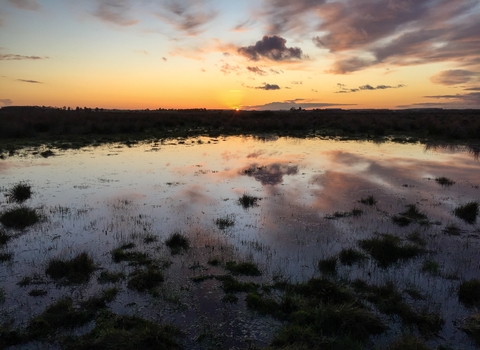The Fens East Peat Partnership (FEPP) have been awarded a substantial “discovery grant” by the government as part of their Nature for Climate Peatland Grant Scheme.
The Fens East Peat Partnership has been awarded £815,877 to explore the feasibility of restoring peatlands in the Fens. The government's Nature for Climate Peatland Grant Scheme “discovery grant” will enable the partnership to investigate the state of peat on 20 sites and neighbouring areas across Cambridgeshire, Lincolnshire, Norfolk and Suffolk. The aim will be to develop site restoration plans for those peatland sites.
FEPP is Lincolnshire Wildlife Trust (project lead), the National Trust, Natural England, Norfolk Wildlife Trust, RSPB and our BCN Trust, who have worked together across the Fens for many years through the Fens for the Future partnership.
Lincolnshire Wildlife Trust, Head of Conservation, Tammy Marie Smalley, said; “These are exciting times: peatlands are now in the spotlight as a habitat, and if managed correctly can help us address the two environmental crises, climate change and biodiversity loss. The Fens are incredibly important area for an array of threatened species, but also as the bread basket of our nation’s food production. We want to work with our partners and neighbours to ensure that water resource management delivers for peatland restoration and much more besides.”
Kate Carver, Great Fen Project Manager said: “Here at the Great Fen we have shown through our internationally important landscape scale conservation that restored peatlands can lock in carbon, protect peat soils, clean water and benefit both wildlife and people. This funding will help us to assess our peat and water resources, to scale up and deliver even more. Through restoring peatlands, the Fens can take positive action against climate change, support nature, and bring both hope and new opportunities for fen communities.”
Sarah Smith, General Manager at the National Trust’s Wicken Fen National Nature Reserve said: “In the wake of the climate conference in Glasgow this is a really important announcement for the Fens. Wicken Fen is already important for nature, but this funding will help us take things a step further. We will be exploring opportunities to restore peat on Sedge Fen, Burwell Fen and Tubney Fen, with the intention of becoming an internationally significant store of carbon.”
Hannah Phillips, Area Manager for RSPB, said: “Restoration of peat not only helps reduce carbon emissions but also provides much needed habitat for fenland species like the bittern, marsh harrier, common crane and marsh carpet moth. Restored wetland sites like RSPB Lakenheath Fen are a fantastic example of what can be achieved. This funding will help us with plans to scale up, creating a network of sites for nature in collaboration with partners and landowners.”
Peatlands are Earth’s largest terrestrial carbon store, holding more than twice the amount of carbon in all the world’s forests. They cover 10.9% of England’s land area. Unfortunately, 87% of our peatlands are degraded. In this state, they do not capture and store carbon but emit an estimated 10 million tonnes of carbon dioxide equivalent every year. The Nature for Climate Peatland Grant Scheme aims to capture this carbon by setting 35,000 ha of degraded peatland on a path to restoration by 2025, to help deliver the UK’s Net Zero target. It will contribute to the Nature Recovery Network with wider benefits to biodiversity, water quality and natural flood management.
The Fens East Peat Partnership project is one of 10 projects from across the country that have been awarded Nature for Climate Peatland Discovery Grants. The grants will help groups develop new projects seeking to restore peatland systems to a natural and healthy state at a landscape scale. The funding will be delivered by Natural England and will help unlock barriers to peatland restoration, enabling projects that would struggle to gain funding to be in a position to apply for future rounds of peat restoration funding.

